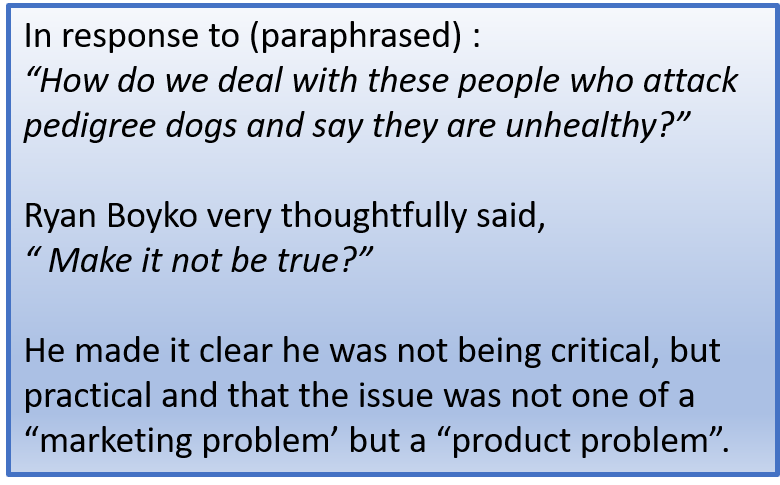Is it "tough talk" or "open dialogue" - and why is it a challenge in the dog world?
Is it "tough talk" or "open dialogue" - and why is it a challenge in the dog world?
As often happens, the same topic comes up several times in a short space of time - and from different sources and angles.
Someone asked me why do many kennel clubs not record or link any health information to pedigrees, when in most countries kennel clubs are under a mandate to not only register dogs, but also to protect the health of those for whom they are responsible? Explanations might include that pedigree people truly care for their dogs and breeds, and may have come to simply assume that because of that they must be acting in the animals' best interest... or, perhaps, they are rather afraid that might not be so, and they are not willing to face open, transparent statistics and information on health... or, it is too time-consuming and expensive. Notwithstanding, the priority for attention to health as part of the responsibility for registration is very evident among many of the IPFD Contributing Partner kennel clubs; but it is certainly not true of all national organizations or breed clubs.
Today, Embark (one of our Sponsor Genetic Test Providers (GTP) in the Harmonization of Genetic Testing for Dogs (HGTD) posted on Facebook a quote from a panel discussion I participated in as part of their online Summit. Although it comes across as very direct, and might take people aback, it is really just factual.

A couple weeks ago I posted a blog called Linebreeding vs. Inbreeding – Let’s be perfectly clear. That post sparked a lot of discussion on Facebook. And yet, the message was very basic. That is, linebreeding is a form of inbreeding and "Linebreeding/inbreeding - by definition - reduces genetic diversity. By how much depends on the closeness of mating pairs and the time/number of generations over which the process is repeated." Really, there should have been nothing surprising or shocking about that blog. But it seems, straight-talk, clear, fact- and evidence-based discussion, seems to startle some in the dog world. Of course, others find is refreshing and welcome it.
Bodil Carlsson, in her blog Collie Friends, in Sweden, posted blogs recently with translations from our IPFD document: Reframing Current Challenges Around Pedigree Dogs A Call for Respectful Dialogue, Collaboration, and Collective Actions. In her discussion, she welcomes the 'straight talk' but is somewhat surprised to hear it from someone who is an official capacity in the dog world (i.e. the CEO of IPFD). She says (Google translation to English):
"[Is it surprising] ... because plain language is uncommon in the dog world, especially from leading people: they tend to have too many interests to consider to speak out."
That may be a very valid, but sad point - except I truly do not think it reflects us! IPFD prides itself on being impartial yet able to talk plainly and practically about issues in the dog world. Because we are an independent and multi-stakeholder organization, one of our great strengths is being able to address challenging issues from a Big Picture view - relatively unhampered by limited or member-focused priorities. Personally, there are many occasions when I endeavour to be somewhat diplomatic, compassionate, and aware of sensibilities. However, I try hard not to let that distract from evidence-based reality.
 Because, let's face it, dealing with the major issues about pedigree dogs and all dogs requires participation from all stakeholders. The challenges across groups - e.g. veterinary organizations, researchers, breeders, breed clubs, kennel clubs and other cynological organizations, the pet industry, regulators, owners, and society, in general - will not be solved by ignoring the fact that all those groups have a say in the overall health, well-being and welfare of dogs. This is why the Reframing document talks about the roles and responsibilities of people in all sectors and calls on all those who care for dogs to step up. Not just the extremists; not just the loudest voices on social media; but the vast majority (I hope) who represent a sort of 'middle'. For example, those who support the breeding of pedigree dogs - but want a clear indication that the health and longevity of purebred dogs is a priority for all those who breeding them. And those who represent breeds not (currently) highlighted as having health issues who must speak up and demand increased stewardship from those responsible for the most challenged breeds - because it matters - to all dogs. And, as I have said, all this, with a little less emotion and more evidence. As Bodil said in her blog - in response to a quote from the Reframing document about confrontational actions looking like protectionism - it looks like protectionism, because it is.
Because, let's face it, dealing with the major issues about pedigree dogs and all dogs requires participation from all stakeholders. The challenges across groups - e.g. veterinary organizations, researchers, breeders, breed clubs, kennel clubs and other cynological organizations, the pet industry, regulators, owners, and society, in general - will not be solved by ignoring the fact that all those groups have a say in the overall health, well-being and welfare of dogs. This is why the Reframing document talks about the roles and responsibilities of people in all sectors and calls on all those who care for dogs to step up. Not just the extremists; not just the loudest voices on social media; but the vast majority (I hope) who represent a sort of 'middle'. For example, those who support the breeding of pedigree dogs - but want a clear indication that the health and longevity of purebred dogs is a priority for all those who breeding them. And those who represent breeds not (currently) highlighted as having health issues who must speak up and demand increased stewardship from those responsible for the most challenged breeds - because it matters - to all dogs. And, as I have said, all this, with a little less emotion and more evidence. As Bodil said in her blog - in response to a quote from the Reframing document about confrontational actions looking like protectionism - it looks like protectionism, because it is.
Next steps? A few specific ideas...
- As others have suggested - read, ponder, discuss - your role and personal responsibility. (Note: The Collie Friends blog, on our Reframing doc is thought-provoking. In my google translation to English there is a term 'reindeer breeds' which I believe should be 'purebreds'.)
- Encourage open discussion among others - open and brave and realistic.
- If you are a pedigree breeder or member of a breed club - start making recommendations on how to prioritize health and longevity, and maintain genetic diversity (e.g. limit use of popular sires, use a wider and larger representation of the available breeding population, use tools for health testing, genetic testing, measure of breed health, etc.). And try to move people to prioritize health before appearance or winning in the show ring.
- Participate in work to further define the Big Picture of health in your breed - see our Get a GRIHP! program, do health surveys, share!!
- Support leadership in kennel clubs as they try to focus on programs for health - don't fight them. Speak up loudly in support to balance against those in opposition or who embrace avoidance and denial.
- Veterinarians - look for ways to support the breeding of healthy dogs, without mainly pointing fingers at others; collaborate with breeders, educate owners. Check our out Meet the Breed features in the Word Small Animal Association Bulletin.
- Legislators - look at the Big Picture, embrace collaboration rather than confrontation, look at the long term implications, not mainly actions that will be popular in the short term. See our presentation to APDAWG in the UK.
- Check out more ideas in our Think Globally, Act Locally - Promoting Open Dialogue and Collective Actions document that will continue to evolve with more ideas on moving forward - together.
- NEED INSPIRATION? There are individuals and clubs approaching health in a proactive way and embracing strategies for breed improvement. Find them! Participate. We highlight them in so many areas on dogwellnet.com including in Breed Specific Health Reports, and there are tools and templates to help. If you have something to share - let us know.
And let me return the favour to Embark, with another quote from their Summit. I view this as sage advice from someone with great business acumen and a commitment to the health of dogs and dog populations.

Is that tough talk? Maybe. Is such talk needed, for the benefit of dogs and dog people? Absolutely.
Let's all keep doing everything we can - personally and collectively for these breeds and dogs who give us so much !!

0 Comments
Recommended Comments
There are no comments to display.
Please sign in to comment
You will be able to leave a comment after signing in
Sign In Now